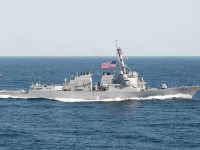AP, The Associated Press
Dec 08, 2015
The United States has deployed a P-8 Poseidon spy plane in Singapore for the first time, amid heightened tensions in the region over China's expansive territorial claims in the South China Sea.
Stewart Taggart, Founder & Principal, Grenatec
Nov 25, 2015
Manila’s just-completed Asia Pacific Economic Cooperation (APEC) consisted of two parts. The official summit agreed on the need to fight terrorism, enhance economic growth, reduce poverty and increase climate change resiliency. Unofficially, the huge political gulf between the U.S. and China over the South China Sea was on display.
Dan Steinbock, Founder, Difference Group
Nov 24, 2015
APEC 2015 ended with a vow to combat terrorism, yet the Summit refused to be distracted from its true goal – economic development. In the coming years, the United States, China, and the Association of Southeast Nations must compromise if they truly want to invest in both regional peace and economic development.
Zhou Bo, Senior Fellow, Center for International Security and Strategy, Tsinghua University
Nov 24, 2015
Washington’s move to politicize this meeting simply reflects the growing frustration of a US that doesn’t know how to deal with China. This time it has taken a wrong approach to confront China at the wrong occasion. The result was not helpful in improving relations among the countries concerned.
Nov 20, 2015
China's top admiral said his forces have shown "enormous restraint" in the face of U.S. provocations in the South China Sea, while warning they stand ready to respond to repeated breaches of Chinese sovereignty.
Wu Zurong, Research Fellow, China Foundation for Int'l Studies
Nov 18, 2015
Mutual respect for sovereignty and territorial integrity is the basic norm of international relations. The US is duty-bound to make a careful study of China’s solemn position on this vital issue and show proper respect for China’s sovereignty instead of taking provocative actions based on contrived legal interpretations.

Richard Weitz, Senior Fellow, Hudson Institute
Nov 13, 2015
Richard Weitz reviews the recent speech of U.S. Defense Secretary Ashton Carter, who describes China’s potential to challenge the U.S.-built international order through its assertive stance in the South China Sea, and finds his approach sensible, given the mixed and fluid strategic relationship between the two countries.

Ben Reynolds, Writer and Foreign Policy Analyst in New York
Nov 13, 2015
In October, the USS Lassen sailed within twelve nautical miles of an artificial Chinese island in the South China Sea as a “freedom of navigation patrol.” Benjamin Reynolds argues that China should not risk a military confrontation by responding to American patrols.

Hu Bo, Director, the South China Sea Strategic Situation Probing Initiative
Nov 12, 2015
US naval actions in the South China Sea are about hegemony and power politics, a prevailing pursuit in the world in the 19th century, under the cloak of a 21st century pretense to safeguard freedom of navigation and international justice. The reality is: The US wants to check any expansion of Chinese power in the South China Sea.

Wang Yusheng, Executive Director, China Foundation for Int'l Studies
Nov 11, 2015
If Washington embraces cooperation instead of pursuing rivalry, all partners can harvest good results, and the US can still be a powerful partner. Why not do so?
Back to Top

- China-US Focus builds trust and understanding between the U.S. and China through open dialogue among thought leaders.
- Our Offerings
- Topics
- Videos
- Podcasts
- Columnists
- Research Reports
- Focus Digest
- Stay Connected
-
Thanks for signing up!
- Get the latest stories from China-US Focus weekly.